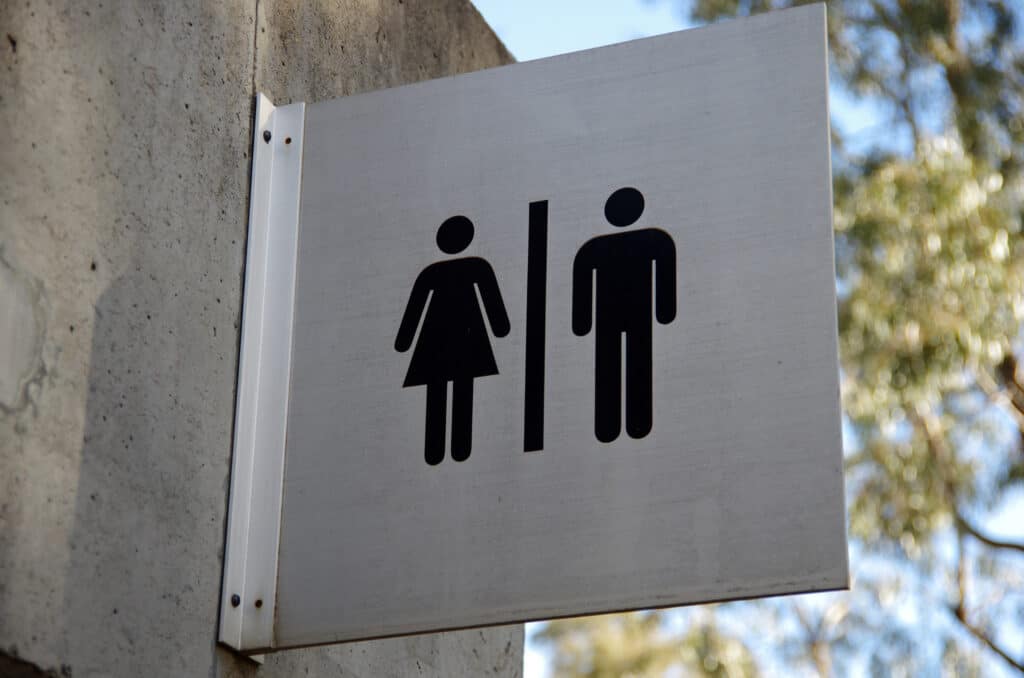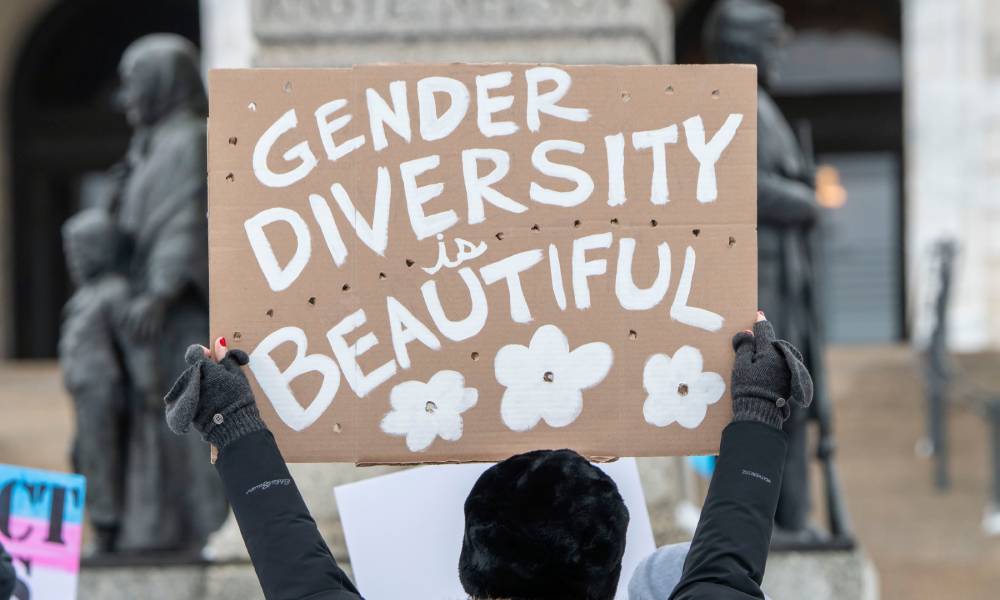Abolishing legal sex and gender comes with many, many pros, radical new report finds
What would life be like if no one had a legal sex or gender?

Legal sex is a shaky concept in the UK, with no single definition. Each of us is assigned a sex at birth, with ‘M’ or ‘F’ recorded on our birth certificates, changeable only through the onerous, medicalised Gender Recognition Act (GRA).
But even then, the law is inconsistent. The Equality Act offers discrimination protections on the basis of sex, which it defines as simply being a man or a woman. But sex-based discrimination can also be on the basis of ‘perceived’ sex (in the same way that discrimination can be based on ‘perceived’ race or sexuality). Trans folk are protected by the Equality Act regardless of whether they have changed their “legal sex” on their birth certificate.
Other laws use sex and gender interchangeably. In short, for all the debate around legal sex, it’s pretty much impossible to define.
The concept of “decertification”, the abolition of legal sex, has been explored by researchers at the Future of Legal Gender project, led by law and political theory research professor Davina Cooper, of The Dickson Poon School of Law and King’s College London.
The research is not designed to argue for or against decertification, Cooper told PinkNews, but to spark questions and debate about how our society is structured.
“What we wanted to do, ideally, was to try and see if we could shift the debate – to move away from a minoritising approach that simply tries to incorporate people, who are deemed not to fit, within an existing structure to questioning the structure,” she explained.

“Legal equality for people who transition and live gender in non-conforming ways is very important. But achieving this within the current structure of sex-based recognition is likely to keep things unequal.
“When it comes to legal sex, we wanted to ask the question, is there any good value and use to having that structure to begin with? What are the arguments in favour of having that structure?
“Or to put it another way, what would need to be put in place for that structure to change in a way that would be a progressive change rather than a libertarian state which withdraws from engaging with questions of gender and equality altogether?”
How legal sex is used, and what it has come to mean in different situations through case law, varies hugely.
“If you look at the Equality Act, a person who has the particular protected characteristic of sex is a referred to as a man or a woman,” Cooper explained.
“So in a way, they’re defining sex by just telling you who are the member categories of that definition of sex.”
The Equality Act also covers perceived protected characteristics like sex, race or sexual orientation, meaning that “the important thing isn’t whether you are in that category or not, but is the assumption that you are a member of the category the basis for the discrimination you’ve experienced”.
Cooper added: “In other areas of law, sex and gender are used interchangeably.”
Abolition of legal sex could ensure that ‘the bodies we are born with don’t determine our opportunities’
The Future of Legal Gender project began in 2018 and published its final report on Tuesday (10 May).
Researchers surveyed more than 3,000 members of the public, conducted 200 interviews with stakeholders including trade unions, regulatory bodies, local councils, service providers, and NGOs, and ran a series of focus groups with law and policy experts.
They came to the conclusion that there are a range of benefits to decertification.
“One is that it helps people to live in gender non-conforming ways, including as agender,” said Cooper.
“You can live and be treated as if you don’t have a gender, and there isn’t the expectation that you should have a gender. It’s a bit like living as an atheist in Britain.”

Overall, the abolition of legal sex would “send a message that the bodies we are born with shouldn’t determine our opportunities or how we might live”.
She explained: “The aspiration would be that it would help to reduce gender-based socialisation, from birth onwards, particularly by those more formal or official bodies that rely on knowing what our sex or gender is and then treating us accordingly… Therefore, you would hope that that could impact gender-based violence, abuse, exploitation, unequal care responsibilities.”
Of course, decertification would not eradicate the “ways in which we are gendered as social people in the world”, but Cooper said it could be “one small part of the process of dismantling that structure”.
“I think it is important to recognise that this isn’t going to dismantle gender-based inequality, simply by no longer registering it,” she said.
“We have racism and we have class inequality, and neither of those operate through a legal status.”
Researchers interviewed ‘gender-critical feminists’
Researchers made sure to include people with a range of viewpoints in the project, including so-called “gender critical feminists”.
The project has received backlash from anti-trans groups, and Cooper said: “When we were designing the project, we knew it was a controversial area… We knew that it was an area where people had very intensely-held feelings.
“But I think the hostility that we got from some sex-based rights feminists, the level of it surprised us.”
Researchers did, however, manage to have some productive discussions, which helped them to consider decertification from every angle.
“It was helpful hearing from critics of decertification, about what their concerns were,” Cooper explained. “Because that then became material to think through and consider: ‘How else could you address these issues?’”
Topics that came up a lot included distinctions between sexes in sports, hospital accommodation, prisons, and data collection, mostly in regard to cisgender women.
“Paralympic sports provides one model where you cluster people according to broadly equal capacities.”
These points allowed researchers to ask more specific questions about the real-world consequences of decertification.
“Take a terrain like sports,” said Cooper.
“The news is filled with stories about who counts as a woman for sports purposes, and legal sex often isn’t relied on, because it doesn’t do the work some people think is needed.
“So sporting bodies focus on testosterone levels, and then they disagree about the right testosterone levels. We don’t want to diminish the value of having women’s sports, but to prompt a different and interesting question: ‘How else might sports be organised?’

“Paralympic sports provides one model where you cluster people according to broadly equal capacities for a given sport. [This doesn’t have to be] just about their musculature or their hormone levels, it could also include weight and size, and other factors that make a difference to success in a particular sport.”
Another example was the conversation around hospital accommodation, where the debate “often becomes about trans women in women’s accommodation”, and self-determination of gender.
But Cooper said: “Some people may want to have gender-specific wards, but some people might, ideally, like shared accommodation based on other criteria, religion, ethnicity, sexuality maybe, or not share accommodation at all. What options are available depends on resourcing, and some options will prove practically unviable.
“The point our research makes is that these issues should be subject to wider public conversations, rather than convention, so people can think about why these allocations get made, what they would want, and why they want it… Some people will argue that decertification creates difficulties, because then how do you know who’s a man and who’s a woman?
“It takes us back to more fundamental questions about how areas of our social life should be organised. Do we want sex and gender to be the basis on which we organise them? Could there be other ways?”
How could decertification be put into practice in England and Wales?
Speculating on what decertification could look like in practice, researchers concluded that it would have to be approached through “slow law”.
The Future of Legal Gender project’s final report notes: “Legal reform doesn’t have to mean a single piece of legislation.
“Decertification could be introduced over time through a series of separate laws that gradually, together, make the compulsory registration of sex, and the assumption that people have a legal sex and gender, redundant.”
These interim steps could include simplifying gender recognition laws, recognising genders other than men and women in law (something the government has so far resisted), or rethinking gendered terms used in laws on housing, reproductive rights and parenting. …
“Decertification may seem a very modest reform or it may seem a significant reorganisation of gender in society. But what decertification does, as a slow law proposal, is to invite us to think about wider change.”
The abolition of legal sex is not going to happen overnight, and probably shouldn’t. If rushed, it could result in efforts to erase the social concept of gender altogether, or to act as if inequality doesn’t exist, Cooper said.
Researchers also noted that several interviewees “suggested that the present political climate was not a suitable or safe one in which to question the architecture of equality law or to radically alter gender and sex categories”.
In other words, decertification would take time, but it has the potential to free every one of us from the gendered constraints deeply embedded in our every day lives, and improve equality across the country.
